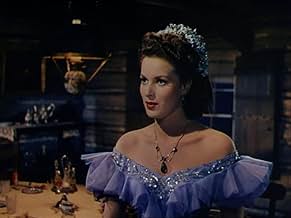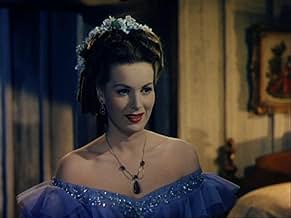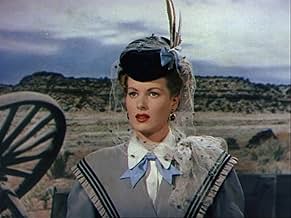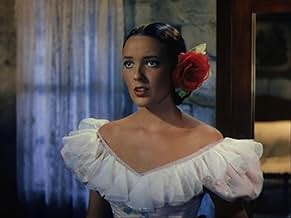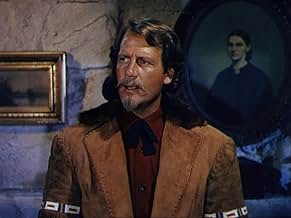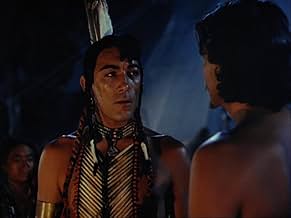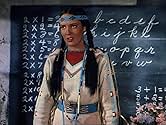Buffalo Bill
- 1944
- Tous publics
- 1h 30m
IMDb RATING
6.4/10
1.8K
YOUR RATING
The story of William "Buffalo Bill" Cody, legendary westerner, from his days as an army scout to his later activities as owner of a Wild West show.The story of William "Buffalo Bill" Cody, legendary westerner, from his days as an army scout to his later activities as owner of a Wild West show.The story of William "Buffalo Bill" Cody, legendary westerner, from his days as an army scout to his later activities as owner of a Wild West show.
- Awards
- 2 wins total
Carl Andre
- Trooper
- (uncredited)
Arthur Aylesworth
- Pool Player Debunking Cody
- (uncredited)
Evelyn Beresford
- Queen Victoria
- (uncredited)
Edward Biby
- Sergeant
- (uncredited)
Sidney Blackmer
- Theodore Roosevelt
- (uncredited)
Billy Bletcher
- Short Man
- (uncredited)
William A. Boardway
- Washington DC Cafe Customer
- (uncredited)
Featured reviews
A lavish Technicolor potboiler shot by Leon Shamroy, who later collected that year's Oscar for colour cinematography for 'Wilson'; although here the most spectacular scenes are obviously the work of Otto Brower's second unit, with the close ups of the leads shot back at the studio.
It commendably takes the side of the American Indian (represented here by Anthony Quinn and Linda Darnell, the latter wearing lots of makeup and the former very little of anything) against the vested financial interests back East, and also gives the plight of the buffalo a nod.
Maureen O'Hara thought her first western "would be forgettable, but it turned out to be one of the biggest moneymakers 20th Century-Fox had that year" and that Joel McCrea although "a very nice man, a good actor, but not rugged like Duke or Brian Keith". He's likeable, however and as usual gives the film heart.
It commendably takes the side of the American Indian (represented here by Anthony Quinn and Linda Darnell, the latter wearing lots of makeup and the former very little of anything) against the vested financial interests back East, and also gives the plight of the buffalo a nod.
Maureen O'Hara thought her first western "would be forgettable, but it turned out to be one of the biggest moneymakers 20th Century-Fox had that year" and that Joel McCrea although "a very nice man, a good actor, but not rugged like Duke or Brian Keith". He's likeable, however and as usual gives the film heart.
If William F. Cody had lived until 1944 he would have loved this film. Most of all he would have approved of the casting of Hollywood's most straight arrow hero Joel McCrea as himself. That's the image Cody liked to convey even if it wasn't exactly the truth.
The real Cody was a brave enough hero all right and this film does mention some of the highlights of his real life, the buffalo hunt with Grand Duke Alexei of Russia, the hand to hand fight with Yellow Hand at War Bonnet Gorge, and the formation of his wild west show.
The trouble was the real Cody got into show business and he was ballyhooed out of all proportion to his real accomplishments. And Cody was lent himself admirably to exploitation.
The movie is the kind of ballyhoo that Cody would have approved. Cody's chief publicist in real life was Ned Buntline who is faithfully portrayed here by Thomas Mitchell. Maureen O'Hara is Louisa Frederici Cody and she's the faithful, but eastern bred wife. No hint of the real marriage problems that plagued the Codys.
Linda Darnell and Edgar Buchanan are in this film and I don't really know why. Darnell is an Indian school mistress and Buchanan is a grizzled old army trooper. No real reason for either of them in the film. Darnell is killed at War Bonnet Gorge and she must have been the first squaw who rode into battle. Buchanan's character is also left hanging in the air. Anthony Quinn is Cheyenne chief Yellow Hand and is Cody's worthy adversary on the screen.
Buffalo Bill Cody's real contribution was the wild west show. Cody had many imitators, but he was the original. Until Hollywood took over with the making of the first silent westerns, these shows created the myths surrounding the winning of the west. Sadly that part of Cody's life is given short shrift.
But Buffalo Bill would have loved this film. Whether today's audience would is open to speculation.
The real Cody was a brave enough hero all right and this film does mention some of the highlights of his real life, the buffalo hunt with Grand Duke Alexei of Russia, the hand to hand fight with Yellow Hand at War Bonnet Gorge, and the formation of his wild west show.
The trouble was the real Cody got into show business and he was ballyhooed out of all proportion to his real accomplishments. And Cody was lent himself admirably to exploitation.
The movie is the kind of ballyhoo that Cody would have approved. Cody's chief publicist in real life was Ned Buntline who is faithfully portrayed here by Thomas Mitchell. Maureen O'Hara is Louisa Frederici Cody and she's the faithful, but eastern bred wife. No hint of the real marriage problems that plagued the Codys.
Linda Darnell and Edgar Buchanan are in this film and I don't really know why. Darnell is an Indian school mistress and Buchanan is a grizzled old army trooper. No real reason for either of them in the film. Darnell is killed at War Bonnet Gorge and she must have been the first squaw who rode into battle. Buchanan's character is also left hanging in the air. Anthony Quinn is Cheyenne chief Yellow Hand and is Cody's worthy adversary on the screen.
Buffalo Bill Cody's real contribution was the wild west show. Cody had many imitators, but he was the original. Until Hollywood took over with the making of the first silent westerns, these shows created the myths surrounding the winning of the west. Sadly that part of Cody's life is given short shrift.
But Buffalo Bill would have loved this film. Whether today's audience would is open to speculation.
The story of Buffalo Bill (Joel McCrea) is showed basically in two parts, beginning in 1877: in the West, when he meets his future wife Louisa Frederici Cody (Maureen O'Hara), his friendship with the Indians, specially with Yellow Hand (Anthony Quinn), and his work, as an explorer of the wild West, ending when his wife returns to the East with his baby son and with a battle against the Cheyenne. The second part begins when he moves to the East, loses his son, separates from his wife, defends the Indians in the civilized society until his retirement. I liked this movie a lot: the battle scenes are fantastic, the story has action, romance, drama and is not corny. I do not know whether the facts are correctly presented or not, but as a movie, it is a great entertainment, recommended for all audiences. Maureen O'Hara's beauty is stunning. My vote is nine.
Title (Brazil): `Buffalo Bill'
Title (Brazil): `Buffalo Bill'
All the action in this movie is mostly towards the beginning-the indian vs calvary battle which bestows the famous reputation of indian-fighter on the main character, Buffalo Bill. The battle scenes are enhanced by the large numbers of real indians who were wearing real eagle feathers, and even the participation of a young indian woman in the battle(a similarity to the Custer battle, where indian women also participated). Staging a battle with large numbers of horses in the middle of a river must have been challenging. The indians would have probably chosen a much better site, but the storyline said they were in a hurry to get through a vital pass and so the clash.Buffalo Bill summarized his feelings for the indians by saying,"they were all my friends." the rest of the movie focuses on his personal life and tragedies. His final speech to his fans gave the viewer a feel for the about-to-be-lost glory and grandeur of the old west.It made me think of how far beyond anything C.B. DeMille ever did the true west really was.
"Buffalo Bill" (1944) is a a fictionalized biopic of the life of "Buffalo Bill" Cody (Joel McCrea) who worked as a scout for the US Army and later traveled East, establishing his Wild West show and becoming an international sensation.
Director William Wellman and a writer worked for months on a script that told the true story of Buffalo Bill, including that he was a drunk, a charlatan and an unfaithful husband, but -- ultimately -- they said they couldn't destroy the legend, so they destroyed their screenplay and hired writers to write the myth.
This explains people's criticism of this classic Western, but if you can accept that it's more myth than fact it's quite entertaining, especially considering the time it came out. Several things surprised me about this movie. For one, it clearly takes a pro-Indian stance and this was a full two decades before it become "hip" to do so. Secondly, the depiction of the Indians is good and they used real Natives as peripheral characters. Although Anthony Quinn plays Yellow Hand, he looks convincing, probably because he had Native blood.
The Cheyenne and Sioux are portrayed in a noble manner as people protecting their way of life from the Europeans who don't keep their word and slaughter the buffalo en masse for no logical reason. There's a stunning scene when the Natives confront the cavalry and Yellow Hand stands up to Buffalo Bill. After the battle, Bill holds the body of an Indian woman he knew (Linda Darnell) and someone asks, "A friend of yours?" Bill sadly responds, "They were all my friends."
Interestingly, a black boy is shown in one of the carnival scenes and even has a line, which is notable considering this was a full two decades before the Civil Rights movement.
Some facts: The character of Yellow Hand was taken from the real-life Cheyenne chief Yellow Hair whom Cody shot, stabbed and scalped after Little Big Horn. As already noted, the movie is a whitewash and omits the fact that Cody sued his wife, Louisa Frederici (Maureen O'Hara), for divorce in 1905. They had four kids, but two died when they were young.
Some criticize the way Bill stands at attention while prince Yellow Hand walks in half-naked wherein Bill lifts his hand and says "How." My Response: Didn't the Europeans (sometimes) talk with half-naked Natives when they met, which was fitting since it was the heat of the summer? So what's the problem with depicting this in the film? And wasn't "Howgh" an actual greeting with some tribes? It was. "Hau" was a greeting of the Lakota/Dakota Sioux, which is one of the two tribes depicted in the film; in fact, this greeting is still used by Sioux people today. Other tribes had similar words for greetings. As such, what's wrong with depicting this in the film, particularly since the actors pulled it off? Besides, at that time in the early 40s it hadn't become the stereotypical cliché that it later became.
Bottom Line: Yes, there's some roll-your-eyes myth-making in "Buffalo Bill" (like the kid with crutches at the end), but the story maintains your attention and there's a lot of rollicking entertainment, especially the exciting Cavalry vs. Indians segments. Beyond that, McCrea and Quinn are great, the locations are spectacular, the women are beautiful and the Natives are presented in a respectable and believable way, particularly considering the picture was made in the early 40s.
The film runs 89 minutes and was shot in Utah, Arizona and Montana.
GRADE: B+
ADDITIONAL COMMENTARY: "Buffalo Bill" was one of the first pro-Native Westerns, which came into vogue by the 60s/70s. This is a good thing because it's important to see the other side of the Indian Wars, but let's not whitewash history. The Black Hills were first inhabited by the Arikara tribe followed by the Cheyenne, Kiowa, Pawnee and Crow. These tribes were defeated by the Sioux, who migrated out of the Minnesota woods (actually chased out by their enemies, the Ojibwa and Chippewa). The Sioux then used their superior numbers to take the Black Hills from the other tribes that resided in the area.
I point this out because Native Americans were guilty of the very thing we accuse European settlers/soldiers/prospectors of doing -- invading lands that weren't theirs.
Furthermore, applying modern thinking is a dishonest tool when inspecting the relations between Native and settler/soldier/prospector.
We always hear of the injustices committed by the US Army or settlers and get a handful of examples: Wounded Knee, Bear River and Sand Creek. Yet we never hear the other side of what caused these events nor do we hear of the atrocities of Natives committed against New Americans. For instance, we never hear of the Dakota "War" of 1862 (Santee Sioux went on the war path and murdered between 600-800 white settlers, which constituted the largest death toll inflicted upon American civilians by an enemy force until 9/11), The Ward Massacre, The Nez Perce uprising which killed dozens of settlers in Idaho and Wyoming, and the Massacre at Fort Mims. We never hear of the countless innocent settlers who were murdered by roaming bands of young "warriors": While a chief was signing a peace treaty on the tribe's behalf they were out robbing, raping and murdering.
I'm just saying that it's easy to be pro-Native sitting on the comfort of your sofa, but not so much when you and your loved ones are threatened with slaughter.
The Europeans wanted the Native's land and resources while the Indians wanted the technology of the Europeans. Both sides used treaties to make peace while still trying to get what they wanted when war was too expensive. Both sides made war when they felt no other option.
I love Native American culture, but the whitewashing of Native atrocities and this revisionist history stuff is dishonest and unbalanced.
Director William Wellman and a writer worked for months on a script that told the true story of Buffalo Bill, including that he was a drunk, a charlatan and an unfaithful husband, but -- ultimately -- they said they couldn't destroy the legend, so they destroyed their screenplay and hired writers to write the myth.
This explains people's criticism of this classic Western, but if you can accept that it's more myth than fact it's quite entertaining, especially considering the time it came out. Several things surprised me about this movie. For one, it clearly takes a pro-Indian stance and this was a full two decades before it become "hip" to do so. Secondly, the depiction of the Indians is good and they used real Natives as peripheral characters. Although Anthony Quinn plays Yellow Hand, he looks convincing, probably because he had Native blood.
The Cheyenne and Sioux are portrayed in a noble manner as people protecting their way of life from the Europeans who don't keep their word and slaughter the buffalo en masse for no logical reason. There's a stunning scene when the Natives confront the cavalry and Yellow Hand stands up to Buffalo Bill. After the battle, Bill holds the body of an Indian woman he knew (Linda Darnell) and someone asks, "A friend of yours?" Bill sadly responds, "They were all my friends."
Interestingly, a black boy is shown in one of the carnival scenes and even has a line, which is notable considering this was a full two decades before the Civil Rights movement.
Some facts: The character of Yellow Hand was taken from the real-life Cheyenne chief Yellow Hair whom Cody shot, stabbed and scalped after Little Big Horn. As already noted, the movie is a whitewash and omits the fact that Cody sued his wife, Louisa Frederici (Maureen O'Hara), for divorce in 1905. They had four kids, but two died when they were young.
Some criticize the way Bill stands at attention while prince Yellow Hand walks in half-naked wherein Bill lifts his hand and says "How." My Response: Didn't the Europeans (sometimes) talk with half-naked Natives when they met, which was fitting since it was the heat of the summer? So what's the problem with depicting this in the film? And wasn't "Howgh" an actual greeting with some tribes? It was. "Hau" was a greeting of the Lakota/Dakota Sioux, which is one of the two tribes depicted in the film; in fact, this greeting is still used by Sioux people today. Other tribes had similar words for greetings. As such, what's wrong with depicting this in the film, particularly since the actors pulled it off? Besides, at that time in the early 40s it hadn't become the stereotypical cliché that it later became.
Bottom Line: Yes, there's some roll-your-eyes myth-making in "Buffalo Bill" (like the kid with crutches at the end), but the story maintains your attention and there's a lot of rollicking entertainment, especially the exciting Cavalry vs. Indians segments. Beyond that, McCrea and Quinn are great, the locations are spectacular, the women are beautiful and the Natives are presented in a respectable and believable way, particularly considering the picture was made in the early 40s.
The film runs 89 minutes and was shot in Utah, Arizona and Montana.
GRADE: B+
ADDITIONAL COMMENTARY: "Buffalo Bill" was one of the first pro-Native Westerns, which came into vogue by the 60s/70s. This is a good thing because it's important to see the other side of the Indian Wars, but let's not whitewash history. The Black Hills were first inhabited by the Arikara tribe followed by the Cheyenne, Kiowa, Pawnee and Crow. These tribes were defeated by the Sioux, who migrated out of the Minnesota woods (actually chased out by their enemies, the Ojibwa and Chippewa). The Sioux then used their superior numbers to take the Black Hills from the other tribes that resided in the area.
I point this out because Native Americans were guilty of the very thing we accuse European settlers/soldiers/prospectors of doing -- invading lands that weren't theirs.
Furthermore, applying modern thinking is a dishonest tool when inspecting the relations between Native and settler/soldier/prospector.
We always hear of the injustices committed by the US Army or settlers and get a handful of examples: Wounded Knee, Bear River and Sand Creek. Yet we never hear the other side of what caused these events nor do we hear of the atrocities of Natives committed against New Americans. For instance, we never hear of the Dakota "War" of 1862 (Santee Sioux went on the war path and murdered between 600-800 white settlers, which constituted the largest death toll inflicted upon American civilians by an enemy force until 9/11), The Ward Massacre, The Nez Perce uprising which killed dozens of settlers in Idaho and Wyoming, and the Massacre at Fort Mims. We never hear of the countless innocent settlers who were murdered by roaming bands of young "warriors": While a chief was signing a peace treaty on the tribe's behalf they were out robbing, raping and murdering.
I'm just saying that it's easy to be pro-Native sitting on the comfort of your sofa, but not so much when you and your loved ones are threatened with slaughter.
The Europeans wanted the Native's land and resources while the Indians wanted the technology of the Europeans. Both sides used treaties to make peace while still trying to get what they wanted when war was too expensive. Both sides made war when they felt no other option.
I love Native American culture, but the whitewashing of Native atrocities and this revisionist history stuff is dishonest and unbalanced.
Did you know
- TriviaMuch of Cody's life as depicted in the film was true: He did fight to the death with Chief Yellow Hand and he did receive the Congressional Medal of Honor (although it was rescinded in 1917 because he was not in the army); his son, Kit Carson Cody, did die (but of scarlet fever, not diphtheria); his wife (not the daughter of a senator) had three other children.
- GoofsEarly in the film, Sergeant Chips McGraw refers to Buffalo Bill's "big Springfield" rifle but Bill is armed with an 1866 Winchester rifle in this scene.
- Quotes
William F. 'Buffalo Bill' Cody: What killed my son?
Doctor: Diptheria.
William F. 'Buffalo Bill' Cody: What's that?
Doctor: A germ.
William F. 'Buffalo Bill' Cody: Where does it come from?
Doctor: Water systems... and sewage. It's a crowd disease. A disease of civilization.
- ConnectionsEdited from Sur la piste des Mohawks (1939)
- How long is Buffalo Bill?Powered by Alexa
Details
- Release date
- Country of origin
- Language
- Also known as
- Buffalo Bill, der weiße Indianer
- Filming locations
- Production company
- See more company credits at IMDbPro
- Runtime1 hour 30 minutes
- Aspect ratio
- 1.37 : 1
Contribute to this page
Suggest an edit or add missing content


